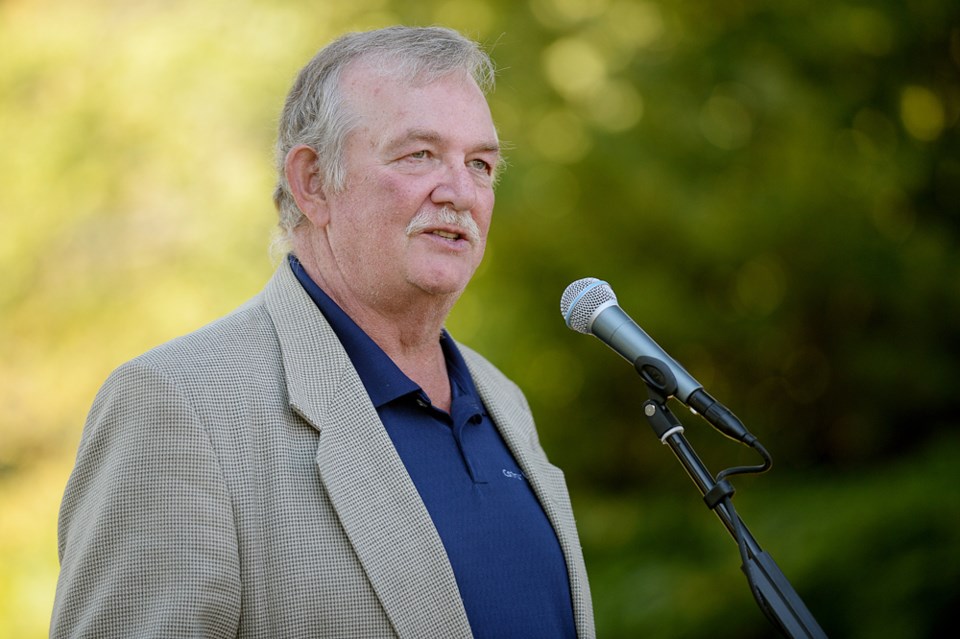The B.C. NDP is keeping its promise to take big money out of municipal politics.
On Monday, the province announced campaign finance reforms for civic elections. The legislation bans corporate, union and out-of-province donations, and puts a $1,200 cap on individual contributions per year. (In September, the New Democrats announced similar rules at the provincial level.)
Once passed, the amendments will be retroactive to Oct. 31, 2017, and will include the 2018 municipal election.
“We’re going to live with it,” Mayor Derek Corrigan, a longtime member of the Burnaby Citizens Association (BCA), told the NOW.
Following the 2014 election, the BCA reported $508,687 in campaign contributions. Corporate donations totalled $275,550 while trade unions pitched in $202,220.
“We’re going to have to go for a campaign that will get more people engaged in making contributions over that time,” Corrigan said of next year’s election.
The mayor, who confirmed he’ll be running in 2018, added he’s concerned people who want to have an influence in politics will “push this kind of legislation to the edge.”
“How do you cope with a person who may have a number of contributions coming from their company, but all from individuals? Are you going to be able to avoid that happening? I don’t think so.”
The NOW requested clarification from the ministry of municipal affairs around Corrigan’s concerns.
In a statement, the ministry said: “The Local Elections Campaign Financing Act has rules that aim to prohibit these sorts of indirect contributions from occurring. These rules were in place in the act prior to the recent amendments. ... (It’s) illegal for any individual or organization (including a corporation or union) to make a contribution by giving money, services or resources to someone else so that they will make a contribution on their behalf. (The act) also makes it illegal for an eligible individual to make a contribution with money, property or services that are not their own.”
The mayor said one thing that’s missing from the legislation is a tax deductibility incentive. Without one, Corrigan noted it’ll be hard to raise money through individual contributions when the giver is not getting anything in return.
“I don’t know how we would ever compete for people’s interest in local politics when they get a deduction for contributing federally and provincially.”
The ministry said it’s “open to talking” with local governments about a tax incentive.
“Careful examination would be required before determining how this could work and whether any such change would be appropriate,” the statement read.
Ray Power has run against the BCA three times, most recently for council as part of the Burnaby First slate in 2014, which collected $27,362 in donations ($21,941 from individuals, $2,150 from corporations and none from unions).
While Power agreed with Corrigan that a tax receipt should be issued, he called the campaign reforms “a necessary change.”
“It should have a positive effect in the long run,” he said. “Individual candidates, now when they go out to put their ideas forward and solicit help, the common response is, ‘Well, you’re not going to be able to defeat the incumbent.’ This might change that.”
Power said the BCA already has a large war chest, given that its annual summer golf tournament has passed, as well as an Oct. 26 fundraiser dubbed “An Evening With Mayor Derek Corrigan and Friends” at the Hilton Vancouver Metrotown Hotel. (Tickets went for $125 each, or $1,125 for a group of 10.)
The BCA will be able to use those contributions because the province is allowing for a transition period. Donations received before Oct. 31 can be used in next year’s election.
Rick McGowan, who’s run for office locally and provincially, called the $1,200 cap “too high.” With no tax incentive, he said most of the donations will come from rich folks, a concern also shared by Corrigan.
McGowan said he’d like to see the province reduce the spending limits during municipal elections, also calling them too high. (The mayoral limit is $138,903 while council members can spend up to $70,126.) The BCA spent $473,728 in 2014, according to documents from Elections B.C.
“Donations are about the influence on the politician rather than the influence on the voter, which is the spending. If you had a cap on how much they can spend, that would be more preferable.”
It’s unknown at this time when the legislation will pass, according to the ministry. The last day of this legislative session is Nov. 3.
New rules
*Donations from any corporation, union or other organization to local candidates, elector organizations, third-party advertisers, and assent voting advertisers are prohibited.
*Campaign funds received prior to Oct. 31, 2017 may be used in the 2018 election to allow for a transition period.
*Individuals will be limited to $1,200 in donations per calendar year. If the legislation passes, they can contribute up to $1,200 to the election campaign of a candidate or elector organization of their choice between Oct. 31, 2017 and Dec. 31, 2017. Donors are allowed to pledge up to $1,200 to unconnected candidates or elector organizations.
*Contributions made between Jan. 1, 2017 and Oct. 30, 2017 are not affected by the new legislation, but those individuals wouldn’t be able to contribute more to that candidate or elector organization that year. Donors would be allowed to contribute up to $1,200 between Jan. 1, 2018 and Dec. 31, 2018.
-Source: Ministry of Municipal Affairs



